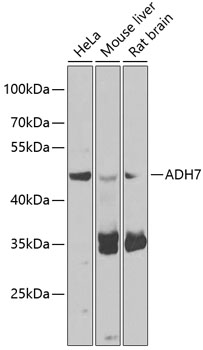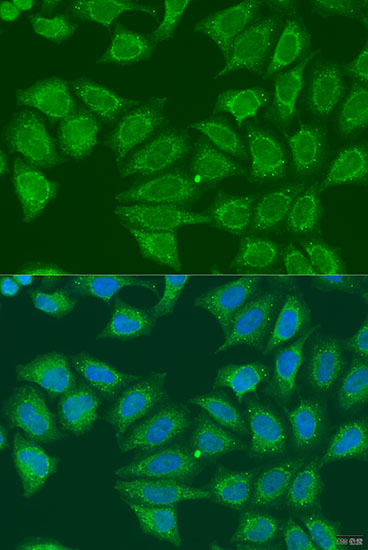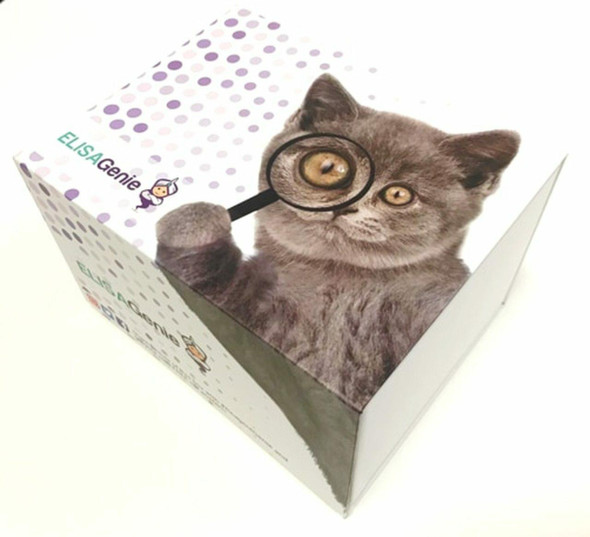Cell Biology Antibodies 11
Anti-ADH7 Antibody (CAB7871)
- SKU:
- CAB7871
- Product Type:
- Antibody
- Reactivity:
- Human
- Reactivity:
- Mouse
- Reactivity:
- Rat
- Host Species:
- Rabbit
- Isotype:
- IgG
- Antibody Type:
- Polyclonal Antibody
- Research Area:
- Cell Biology
Description
| Antibody Name: | Anti-ADH7 Antibody |
| Antibody SKU: | CAB7871 |
| Antibody Size: | 20uL, 50uL, 100uL |
| Application: | WB IF |
| Reactivity: | Human, Mouse, Rat |
| Host Species: | Rabbit |
| Immunogen: | Recombinant fusion protein containing a sequence corresponding to amino acids 1-386 of human ADH7 (NP_000664.2). |
| Application: | WB IF |
| Recommended Dilution: | WB 1:500 - 1:2000 IF 1:50 - 1:200 |
| Reactivity: | Human, Mouse, Rat |
| Positive Samples: | HeLa, Mouse liver, Rat brain |
| Immunogen: | Recombinant fusion protein containing a sequence corresponding to amino acids 1-386 of human ADH7 (NP_000664.2). |
| Purification Method: | Affinity purification |
| Storage Buffer: | Store at -20'C. Avoid freeze / thaw cycles. Buffer: PBS with 0.02% sodium azide, 50% glycerol, pH7.3. |
| Isotype: | IgG |
| Sequence: | MFAE IQIQ DKDR MGTA GKVI KCKA AVLW EQKQ PFSI EEIE VAPP KTKE VRIK ILAT GICR TDDH VIKG TMVS KFPV IVGH EATG IVES IGEG VTTV KPGD KVIP LFLP QCRE CNAC RNPD GNLC IRSD ITGR GVLA DGTT RFTC KGKP VHHF MNTS TFTE YTVV DESS VAKI DDAA PPEK VCLI GCGF STGY GAAV KTGK VKPG STCV VFGL GGVG LSVI MGCK SAGA SRII GIDL NKDK FEKA MAVG ATEC ISPK DSTK PISE VLSE MTGN NVGY TFEV IGHL ETMI DALA SCHM NYGT SVVV GVPP SAKM LTYD PMLL FTGR TWKG CVFG GLKS RDDV PKLV TEFL AKKF DLDQ LITH VLPF KKIS EGFE LLNS GQSI RTVL TF |
| Gene ID: | 131 |
| Uniprot: | P40394 |
| Cellular Location: | Cytoplasm |
| Calculated MW: | 41kDa/42kDa |
| Observed MW: | 50kDa |
| Synonyms: | ADH7, ADH4 |
| Background: | This gene encodes class IV alcohol dehydrogenase 7 mu or sigma subunit, which is a member of the alcohol dehydrogenase family. Members of this family metabolize a wide variety of substrates, including ethanol, retinol, other aliphatic alcohols, hydroxysteroids, and lipid peroxidation products. The enzyme encoded by this gene is inefficient in ethanol oxidation, but is the most active as a retinol dehydrogenase; thus it may participate in the synthesis of retinoic acid, a hormone important for cellular differentiation. The expression of this gene is much more abundant in stomach than liver, thus differing from the other known gene family members. Alternative splicing results in multiple transcript variants. |
| UniProt Protein Function: | ADH7: Could function in retinol oxidation for the synthesis of retinoic acid, a hormone important for cellular differentiation. Medium-chain (octanol) and aromatic (m-nitrobenzaldehyde) compounds are the best substrates. Ethanol is not a good substrate but at the high ethanol concentrations reached in the digestive tract, it plays a role in the ethanol oxidation and contributes to the first pass ethanol metabolism. Belongs to the zinc-containing alcohol dehydrogenase family. Class-IV subfamily. 2 isoforms of the human protein are produced by alternative splicing. |
| UniProt Protein Details: | Protein type:Xenobiotic Metabolism - drug metabolism - cytochrome P450; Xenobiotic Metabolism - metabolism by cytochrome P450; Oxidoreductase; Cofactor and Vitamin Metabolism - retinol; Carbohydrate Metabolism - glycolysis and gluconeogenesis; Amino Acid Metabolism - tyrosine; EC 1.1.1.1; Lipid Metabolism - fatty acid Chromosomal Location of Human Ortholog: 4q23-q24 Cellular Component: cytosol Molecular Function:alcohol dehydrogenase activity; alcohol dehydrogenase activity, zinc-dependent; aldehyde oxidase activity; ethanol binding; receptor antagonist activity; retinol binding; retinol dehydrogenase activity Biological Process: ethanol oxidation; fatty acid omega-oxidation; response to bacterium; response to ethanol; retinoid metabolic process |
| NCBI Summary: | This gene encodes class IV alcohol dehydrogenase 7 mu or sigma subunit, which is a member of the alcohol dehydrogenase family. Members of this family metabolize a wide variety of substrates, including ethanol, retinol, other aliphatic alcohols, hydroxysteroids, and lipid peroxidation products. The enzyme encoded by this gene is inefficient in ethanol oxidation, but is the most active as a retinol dehydrogenase; thus it may participate in the synthesis of retinoic acid, a hormone important for cellular differentiation. The expression of this gene is much more abundant in stomach than liver, thus differing from the other known gene family members. Alternative splicing results in multiple transcript variants. [provided by RefSeq, Oct 2009] |
| UniProt Code: | P40394 |
| NCBI GenInfo Identifier: | 292495000 |
| NCBI Gene ID: | 131 |
| NCBI Accession: | P40394.2 |
| UniProt Secondary Accession: | P40394,Q13713, A2RRB6, A8MVN9, B2R760, B4DWV6, |
| UniProt Related Accession: | P40394 |
| Molecular Weight: | 42,467 Da |
| NCBI Full Name: | Alcohol dehydrogenase class 4 mu/sigma chain |
| NCBI Synonym Full Names: | alcohol dehydrogenase 7 (class IV), mu or sigma polypeptide |
| NCBI Official Symbol: | ADH7 |
| NCBI Official Synonym Symbols: | ADH4 |
| NCBI Protein Information: | alcohol dehydrogenase class 4 mu/sigma chain |
| UniProt Protein Name: | Alcohol dehydrogenase class 4 mu/sigma chain |
| UniProt Synonym Protein Names: | Alcohol dehydrogenase class IV mu/sigma chain; Gastric alcohol dehydrogenase; Retinol dehydrogenase |
| Protein Family: | Alcohol dehydrogenase |
| UniProt Gene Name: | ADH7 |
| UniProt Entry Name: | ADH7_HUMAN |








